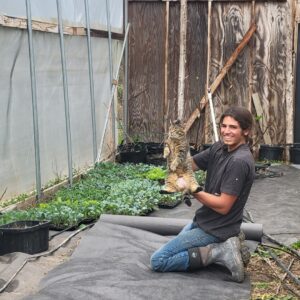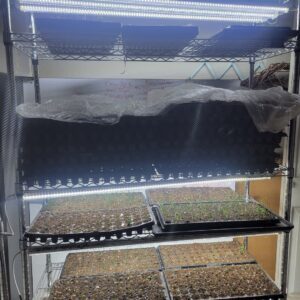
More hakurei turnips and plants starts!
Hey Folks, Looks like we can finally get back to work getting things planted this coming week/weekend as temps warm up and we catch a
The online store is open from Thursday 8PM to Monday. You don’t need an account to buy our products, but if you can’t complete your purchase, it means the store is closed. Delivery/Pickup Options

We are still going with weekly orders but have been super busy with the season approaching! We have been knocking out lots of projects and hope to have a big planting push this week!
Here we have our garlic rows pictured with our grass paths filled with a medicinal weed known as dead nettle, which the bees have been all over. You may be confused seeing the plastic in our production, but we are giving it a shot using a thick non degradable, reusable landscape fabric vs a single-use thin plastic that is standard in organic and conventional production systems. This is one of our biggest effort to cut down our potential plastic waste and know that this is a worldwide issue that does not receive much thought or attention from consumers. The likelihood that you buy produce from the farmers market that was grown in single-use plastic is very high. Unless you know the farmer and their practices you may be contributing way more plastic waste than what meets the eye.
Single-use Plastic offers upwards of 50% increases in growing without plastic mulch. Growing a plant in a plastic mulch reduces the loss of fertilizers, reduces the need for weeding, holds more water in the soil, and simply adds more water weight to produce. (Erik Kobayashi-Solomon, 2019)
Unfortunately, without single-use plastic, we would probably have a vegetable shortage in little time. Operating a vegetable farm there is a fine line between making a profitable production and losing money from lost inputs or excessive labor. Single-use plastic makes it much easier to be profitable but at a major environmental cost.
In 2019, one estimate claimed there to be at least 55,000 tons at an agricultural dumpsite in Florida.
We grew one crop of sweet potatoes many years ago testing out single-use plastic and filled up a whole utility trailer only from 400 bed-foot rows.
Aside from the ridiculous amount of waste produced there has been a lot of research showing that plastic particles are also being found in plant roots, crops, and even human blood. These plastics may be altering the soil-microbe relationship in the soil as well. (Klob, 2022)
We have had a couple of requests through the years to reduce our plastic footprint in our packaging and have finally figured out a solution to switch to paper packaging. We now have an option at the checkout page to opt-in to have your order packaged in paper instead of plastic. We hope that having this option we can justify the cost difference and not be hurting from making the decision. Depending on how many bags you think it will take you can choose 1 or 2 or add as many as you wish.
The reason that we are still using plastic bags is that the price difference is quite drastic for such a slim margin on the veggies. We hope that with this option we can further decrease our plastic use for the outer bagging in total, but we still don’t know of a solution for the thin poly bags that we package our greens and roots in. If anybody has any ideas or solutions we are happy to hear them! Since refrigerators are fan-cooled without the plastic baggie the greens will wilt before they arrive. We have not tried the compostable bags because I have read that they are worse than plastic and that they do not actually compost.

Kobayashi-Solomon, E. (2019) Feeding the world with plastic, Forbes. Forbes Magazine. Available at: https://www.forbes.com/sites/erikkobayashisolomon/2019/05/24/feeding-the-world-with-plastic/?sh=7481b1075ada (Accessed: January 25, 2023).
Kolb , N. (2022) The overlooked root of plastic culture in the food system, Sierra Club. Available at: https://www.sierraclub.org/sierra/overlooked-root-plastic-culture-food-system (Accessed: January 25, 2023).

Hey Folks, Looks like we can finally get back to work getting things planted this coming week/weekend as temps warm up and we catch a

Hey Everyone, I wanted to give you a quick update – we currently have a fresh batch of delicious salad turnips available this week.

Hey folks, Hope everyone is having a great winter and keeping in good health. Coming off a hot and very dry 2023 we are thankful to

Hey folks, Going into next week we will begin our first cut of lettuce mix for 2023! We also decided to use up some older lettuce

Sign up to get the latest news, crop lists, deals and store changes!